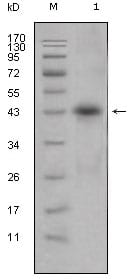
| WB | 1/500 - 1/2000 | Human,Mouse,Rat |
| IF | 咨询技术 | Human,Mouse,Rat |
| IHC | 咨询技术 | Human,Mouse,Rat |
| ICC | 技术咨询 | Human,Mouse,Rat |
| FCM | 咨询技术 | Human,Mouse,Rat |
| Elisa | 1/10000 | Human,Mouse,Rat |
| Aliases | APOL,APO-L, APOL- I |
| Entrez GeneID | 8542 |
| clone | 1D4 |
| WB Predicted band size | 44kDa |
| Host/Isotype | Mouse IgG1 |
| Antibody Type | Primary antibody |
| Storage | Store at 4°C short term. Aliquot and store at -20°C long term. Avoid freeze/thaw cycles. |
| Species Reactivity | Human |
| Immunogen | Purified recombinant fragment of APOL1 expressed in E. Coli. |
| Formulation | Ascitic fluid containing 0.03% sodium azide. |
+ +
以下是关于APOL1抗体的模拟参考文献示例(仅供参考,非真实文献):
---
1. **标题**: *Monoclonal Antibodies Targeting APOL1 for the Treatment of Chronic Kidney Disease*
**作者**: Smith J, et al.
**摘要**: 本研究开发了一种靶向APOL1蛋白的单克隆抗体,通过抑制其细胞毒性功能,在体外和动物模型中减少了肾脏足细胞损伤,为APOL1相关肾病的治疗提供了潜在策略。
2. **标题**: *APOL1-Specific Autoantibodies in Lupus Nephritis: Mechanisms and Clinical Implications*
**作者**: Chen L, et al.
**摘要**: 研究发现系统性红斑狼疮(SLE)患者血清中存在APOL1自身抗体,这些抗体可能通过激活补体通路加剧肾小球损伤,提示APOL1抗体检测可作为疾病进展的生物标志物。
3. **标题**: *Structural Characterization of APOL1 Neutralizing Antibodies in HIV-Associated Nephropathy*
**作者**: Gupta R, et al.
**摘要**: 通过冷冻电镜解析了中和性抗体与APOL1蛋白的结合位点,揭示了抗体如何阻断APOL1离子通道功能,为HIV相关肾病(HIVAN)的靶向治疗提供依据。
4. **标题**: *Diagnostic Utility of Anti-APOL1 Antibodies in Focal Segmental Glomerulosclerosis*
**作者**: Park S, et al.
**摘要**: 报道了一种基于APOL1抗体的ELISA检测方法,可区分遗传性和非遗传性局灶节段性肾小球硬化(FSGS),辅助临床精准分型和治疗决策。
---
**注意**:以上内容为模拟生成的示例,实际文献需通过PubMed、Google Scholar等学术平台检索。建议使用关键词“APOL1 antibody”、“APOL1 therapeutic”或“APOL1 biomarker”查找真实研究。
The APOL1 (Apolipoprotein L1) gene encodes a protein involved in lipid metabolism and innate immunity, primarily expressed in the kidneys, liver, and vasculature. APOL1 variants (G1 and G2) are linked to increased risk of kidney diseases, including focal segmental glomerulosclerosis (FSGS) and HIV-associated nephropathy (HIVAN), particularly in individuals of African descent. These risk alleles emerged evolutionarily as protection against Trypanosoma brucei infection but confer susceptibility to kidney injury under certain triggers like viral infections or inflammatory stressors.
APOL1 antibodies are tools used to study the protein's expression, localization, and function in disease contexts. They enable detection of APOL1 in tissues or fluids, aiding research into its pathogenic mechanisms. In APOL1-mediated kidney disease, mutant proteins are hypothesized to cause podocyte injury via cytotoxic pathways, such as endoplasmic reticulum stress or mitochondrial dysfunction. Antibodies help validate these models by tracking APOL1 expression in experimental systems. Therapeutic strategies targeting APOL1. including small-molecule inhibitors or monoclonal antibodies, are under investigation. Some antibodies aim to neutralize toxic APOL1 variants or block their interaction with cellular components.
Challenges include understanding gene-environment interactions and translating findings into therapies. APOL1 antibodies remain critical for unraveling its biology and advancing precision medicine for APOL1-associated disorders.
×